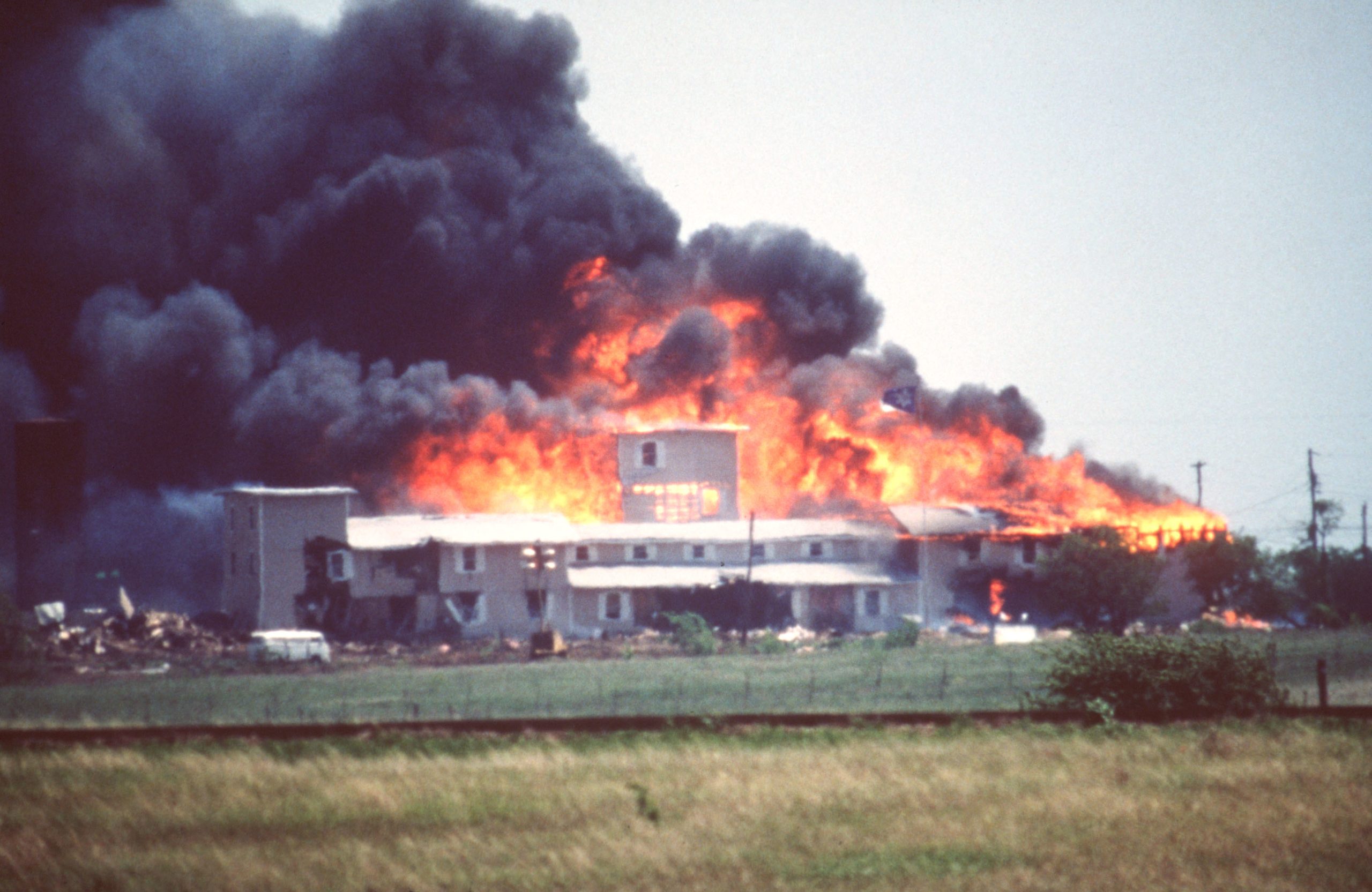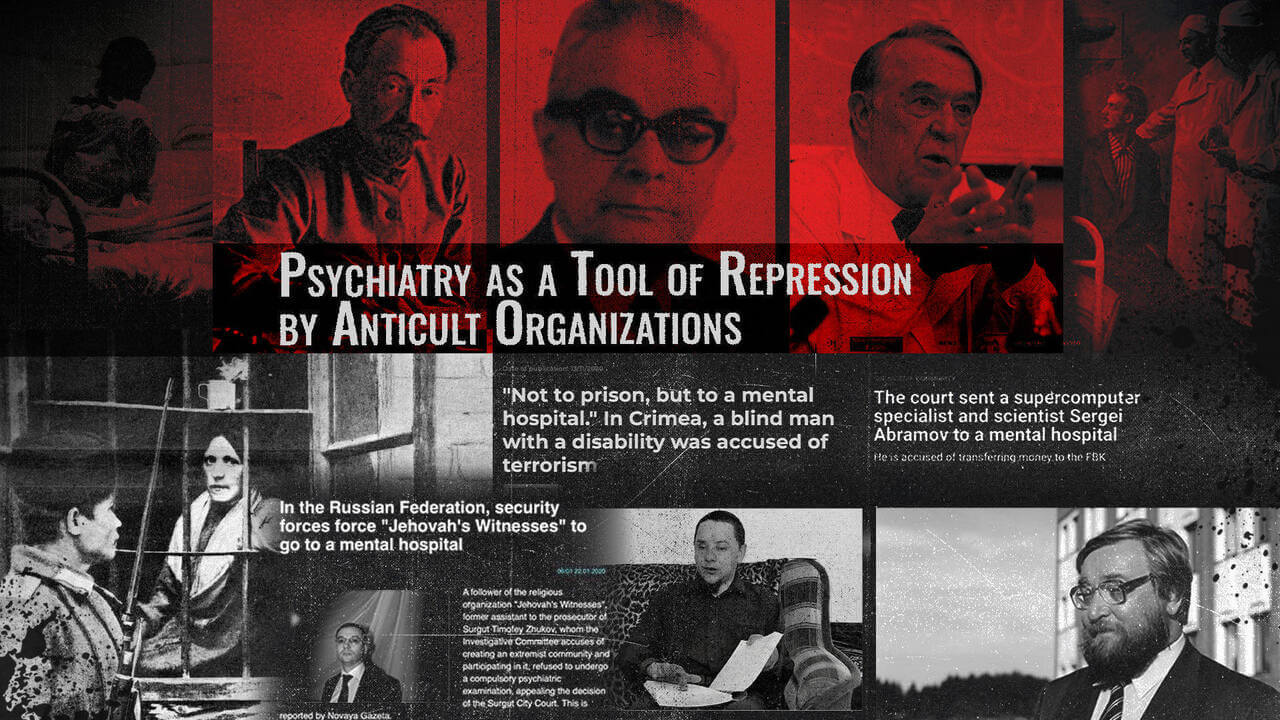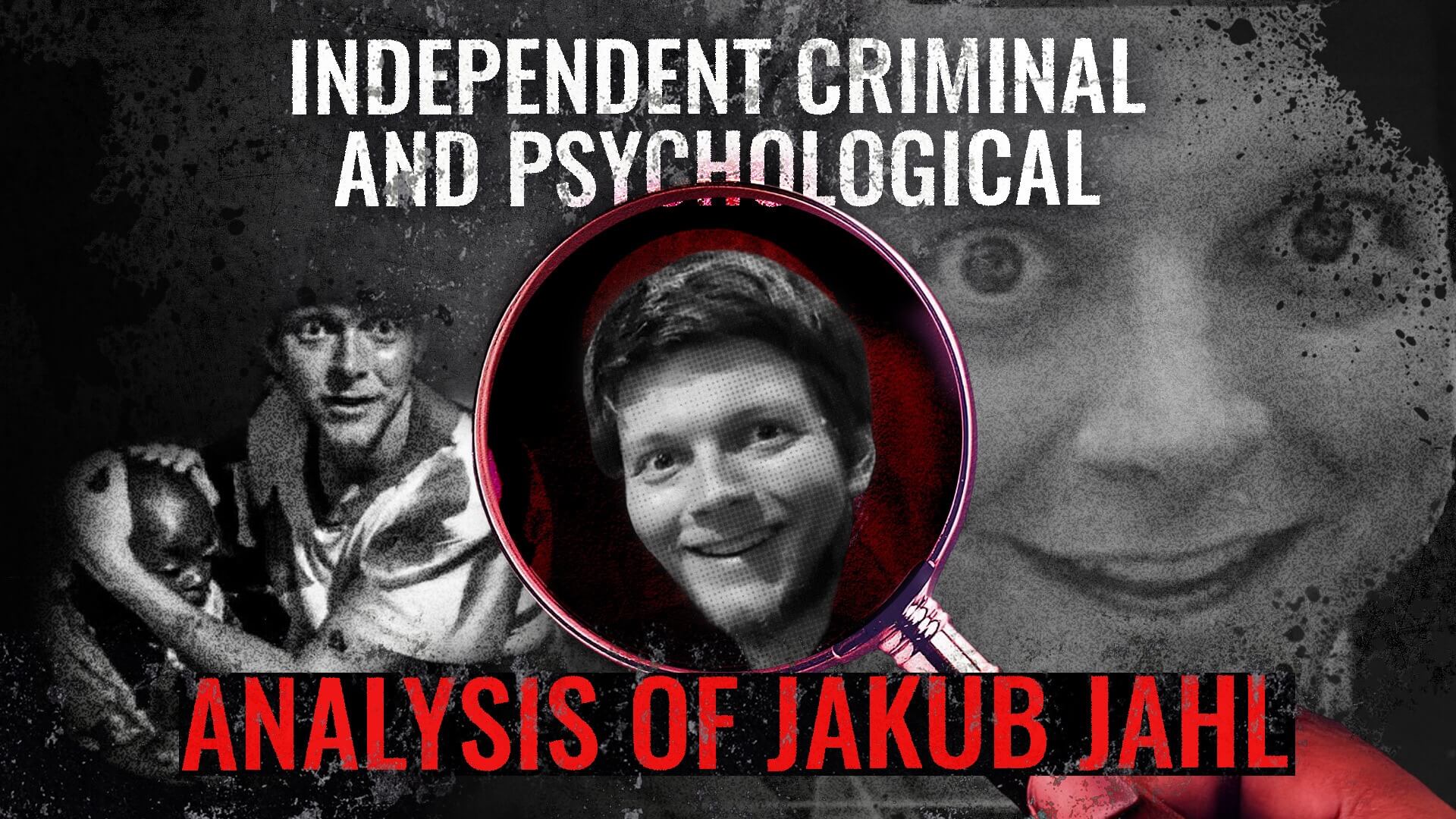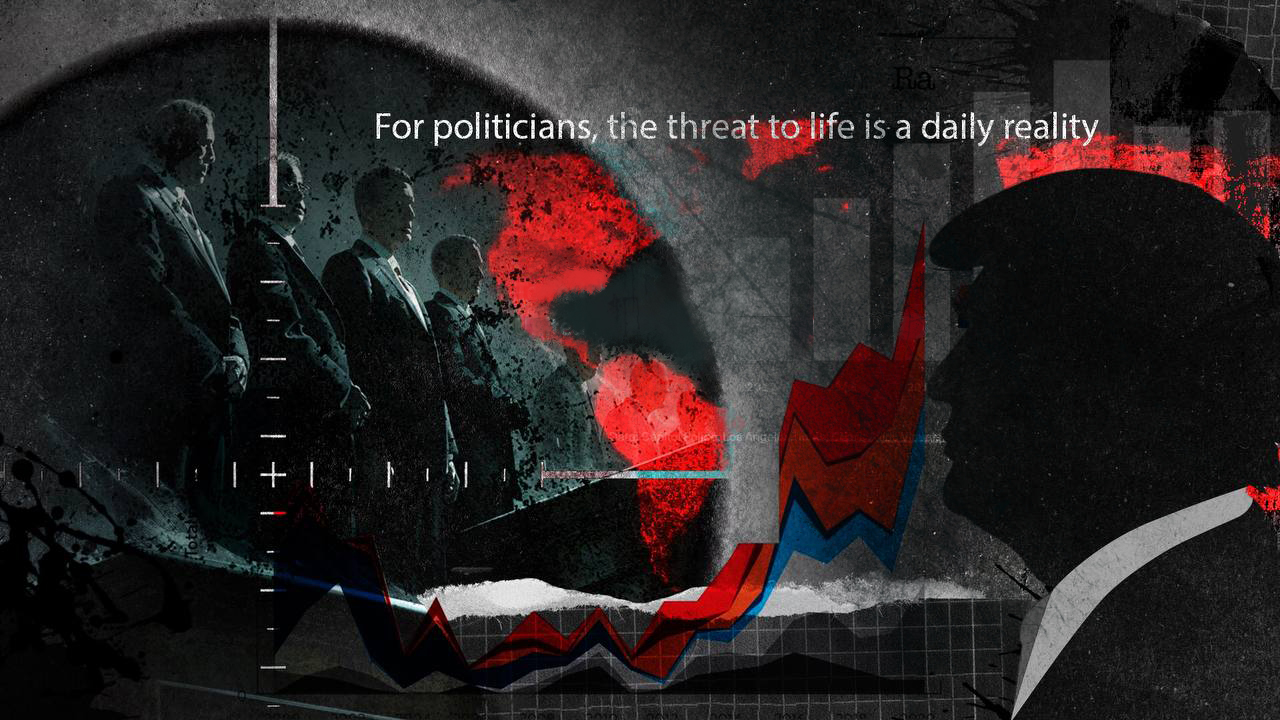The siege of the Branch Davidians’ compound, a group of American citizens and Seventh-day Adventists, in Waco during the spring of 1993 was a pivotal event in U.S. history. It triggered an unprecedented wave of violence and forever altered the nation’s fate. The 51-day standoff ended with an FBI assault, which resulted in a devastating fire. A total of 82 people died, including Americans and members of the Branch Davidians from other countries, among them 23 children. Among the children were two infants who were born in the fire when their mothers died 1.
The events at Waco led to the bombing of the federal building in Oklahoma City in 1995, carried out as “revenge for Waco.” It remains the deadliest act of domestic terrorism in U.S. history. The wave of school shootings that have plagued America in recent decades began with the Columbine High School shooting, initially planned for April 19, 1999 — the sixth anniversary of the end of the Waco siege and the fourth of the Oklahoma City bombing. The serious political and national division in the U.S., often compared to the Civil War, also traces its roots back to the events in Waco in 1993.
In this series of articles, we will present facts indicating who was behind organizing this key event in the spring of 1993. These events were preceded by several years of intense activity by anti-cultists aimed at discrediting the American people of Branch Davidians through demonization and dehumanization in the media and marginalizing public opinion. Anti-cultists also engaged in extensive disinformation campaigns directed at law enforcement, aiming to provoke an excessive use of force.
The Davidian Seventh Day Adventists (DSDA) group was founded near Waco in 1935 in a place they called Mount Carmel. Later, they added “Branch” to their name, inspired by a biblical passage in Isaiah (“and a branch shall grow out of his roots”). This group of American people lived peacefully for over fifty years and was known as good, law obeying citizens. They lived on land they defended in the 1980s from the self-proclaimed prophet George Roden, who tried to usurp it but lost a series of court battles. They built a home on this land with their own hands and earned their living through hard work.

It is worth noting that until the late 1980s, the press referred to the Branch Davidians respectfully as a “religious group.” The term “cult” was initially applied to them by anti-cultists and was propagated through defamatory articles and media materials produced by journalists working directly with anti-cultists. This smear campaign started several years before the tragic events.
The primary target was the young preacher and leader of a group of American citizens practicing Davidian branch of Adventism, Vernon Howell, who changed his name to David Koresh for religious reasons. He was labeled as the “leader of a dangerous cult.”
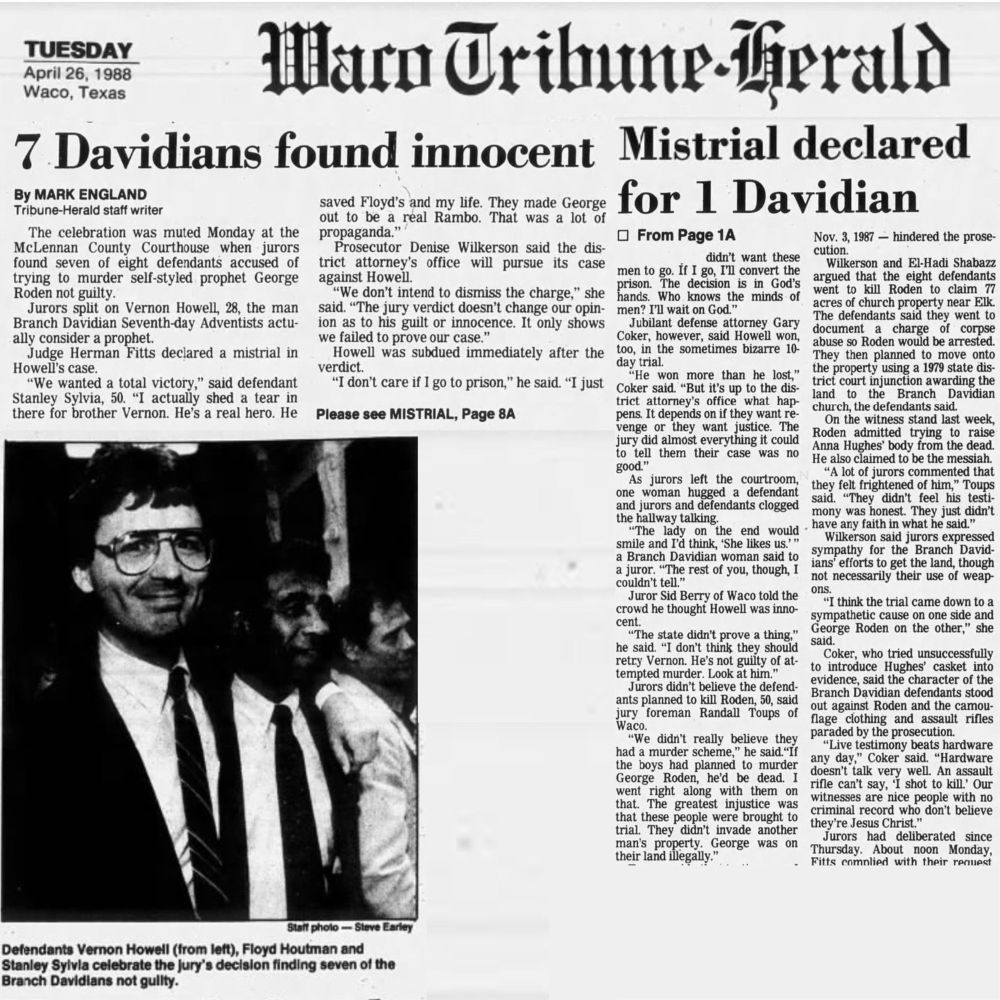
The demonization campaign against the Branch Davidians was led by anti-cultist and deprogrammer Rick Ross. Under his direction, a group was organized specifically to target and demonize the people of Branch Davidians. This group included anti-cultists from the Cult Awareness Network (CAN) — the leading anti-cult organization in the U.S. — along with recruited former members of the Branch Davidians, their relatives, and reporters from various news outlets and popular TV programs. By the early 1990s, CAN was the main anti-cult organization in the U.S., and Rick Ross was one of its most “effective” deprogrammers.
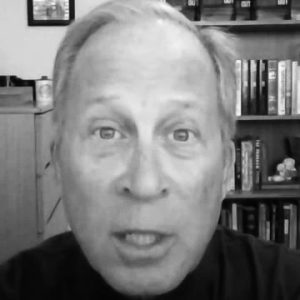
In 1987, Ross conducted the forcible deprogramming of two american citizens practicing Branch Davidians in upstate New York. In 1988, Ross and other CAN members began actively gathering information to destroy the group of Branch Davidians and David Koresh. They started by searching for apostates and candidates for the role of false “victims.”
A false “victim” is a classic tactic used by anti-cultists, where a former member of a religious group (apostate), or a relative of a member, influenced by anti-cultists, makes false statements about their experience in the group to provoke public outrage and prompt law enforcement to take action against the maligned group.
Apostates, also known as “defectors and traitors,” would often tell “atrocity tales” of manipulation, deceit, or coercion they allegedly experienced. These defectors often receive significant media attention, which uses their accounts to create sensational news. This is especially true if the defector is willing to “expose” the “secrets” of the group they once belonged to. Academic researchers and sociologists approach the testimonies of apostates with caution, considering their bias and personal motives.
The tactic of using “horror stories” or “atrocity propaganda,” often employed by apostates and anti-cultists, was also widespread in Nazi Germany. It was used to demonize Jews and manipulate the population. An example of such “atrocity stories” is Hitler’s last directive, issued fifteen days before his suicide, which proclaimed the post-war intentions of “Jewish Bolsheviks” to commit complete genocide against the German people. This directive claimed that all men would be sent to labor camps in Siberia and women and girls would be turned into military sex slaves. This type of manipulation was similarly used by anti-cultists against the Branch Davidians and David Koresh.
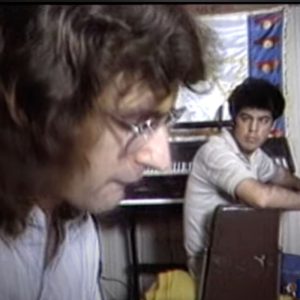
Mark Breault took on the role of the main apostate. He, along with his wife, left the Branch Davidians in 1989 after a conflict with David Koresh, driven by personal grievances. Upon moving to Australia, where the Branch Davidians had a group of followers, he aimed to recruit new apostates and proclaimed himself a prophet, denouncing Koresh as a false prophet at Bible study meetings.
Breault managed to sway several families and relatives of the Branch Davidians in Australia, including the Gent family, as well as from California, where there was also a group in La Verne, near Los Angeles. They began a concerted disinformation campaign aimed at US authorities, claiming that Koresh and all other people of the Branch Davidians posed a threat.

An important ally in these efforts was Robyn Bunds, an apostate from California who had a child with David Koresh named Shaun. In 1990, Mark Breault and Robin Bunds launched a smear campaign, alleging to Branch Davidians in Australia and California, as well as to US immigration officials, California police, and law enforcement in Texas, that David Koresh planned human sacrifices and “killing children.”
Rick Ross and Mark Breault used a classic anti-cult approach. They imposed on the public the assertion that the Branch Davidians were a “dangerous destructive cult” and that Koresh used “brainwashing” to control group members, suggesting he could have killed former members and even ordered mass suicide 2.
Anti-cultists used the theory of “brainwashing” during early court cases involving kidnappings and violent deprogramming. They tried to convince juries that their victims had been “brainwashed” in a “dangerous cult.” They kidnapped the victims, held them captive for weeks, and subjected them to psychological torture. Their goal was to break the victim down and bend them to their will, turning them into a compliant apostate. Despite these actions, they claimed they were merely “trying to help” this “brainwashed zombie.”
Such testimonies in courts were given by self-proclaimed “cult experts.” Among them were Rick Ross, who only formally finished high school and had a history of severe mental illness, and Steven Hassan, who officially received his license in 1992. Hassan’s license was later revoked by the Committee on Registration of Professions in the Field of Mental Health for “failure to respect the dignity and promote the welfare of clients” and for “unprofessional conduct and behavior that undermines public trust in the integrity of the profession.”
“Expert testimonies” supporting the “brainwashing” theory met their ultimate defeat in the 1990 federal court case, “United States v. Fishman.” The defendant, Steven Fishman, a former member of the Church of Scientology, was accused of mail fraud. Fishman argued in his defense that he had been “brainwashed” by the church and could not be held responsible for his actions. The court seriously examined the scientific viability of the “brainwashing” theory. It determined that it did not meet federal standards for admissibility as scientific evidence. The court banned the testimonies of “cult experts” who had long supported the brainwashing theory as credible and established science. Once the government became a party to the legal proceedings and was forced to investigate the brainwashing claims, the use of this pseudoscience in courts finally ceased.
The American Psychological Association and the American Sociological Association also rejected the theory of brainwashing as lacking credible scientific or scientific evidence.
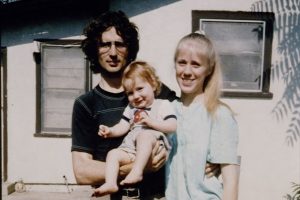
However, in September 1990, Breault and a group of defectors from Australia hired a private detective, wrote nine written affidavits demonizing the American citizens practicing Branch Davidian Seventh Day Adventism as a “dangerous cult” where everyone had been “brainwashed,” and sent a detective along with the affidavits signed by Australian apostates to meet with local authorities in La Verne, California, and Waco, Texas, as well as with employees of the IRS and US Immigration Service. Law enforcement agencies rejected these claims due to lack of evidence, dismissing them as mere unsubstantiated defamation.
The detective continued to work for the anti-cult group for several years. His main responsibility was gathering information and searching for compromising materials on the U.S. citizens of Branch Davidians.
On October 31, 1991, Mark Breault called David Jewell, who lived in Michigan and had never been a member of the Branch Davidians. However, he had a daughter, Kiri, with Sherry Jewell. Sherry was a Branch Davidian. Using the same “horror stories,” Breault convinced David to initiate a custody battle over Kiri, attempting to strip Sherry, whom he called a “brainwashed sect member,” of her parental rights. Mark Breault testified during a court hearing held in Michigan in February 1992, trying to persuade the court with anti-cult rhetoric. However, the court did not find Breault’s testimony convincing and awarded joint custody to David and Sherry Jewell.
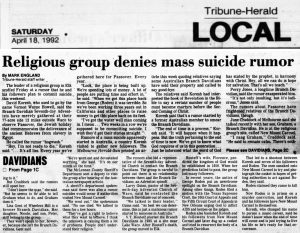
In February 1992, Mark Breault and David Jewell reported allegations of child abuse by the parents of Branch Davidians at Mount Carmel to the Texas Child Protective Services (CPS). Based on their claims, CPS officials visited Mount Carmel three times. Physical examinations of 12 children of Branch Davidian revealed no signs of abuse or trauma. Interviews were conducted with both adults and children, with the children denying any mistreatment and the adults vehemently denying the use of harsh disciplinary methods on children. Due to a lack of evidence supporting the allegations of child abuse, the case was closed several months later.
In March 1992, Mark Breault, David Jewell, and others began asserting that the people of Branch Davidians were planning a mass suicide on April 18, 1992. They claimed that without intervention, Mount Carmel would become “another Jonestown.” They wrote a letter to Congressman Fred Upton from Michigan, who forwarded it to Congressman Chet Edwards from Texas, who then passed it on to the FBI. The FBI closed the case due to lack of evidence. Apostates never explained why the “planned” mass suicide for April 1992 never materialized.
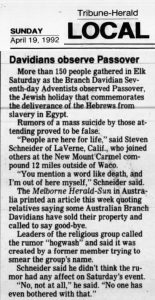
The claim of mass suicide was sensationalized in the press and became an example of close collaboration between anti-cultists, solidifying their ties with the Waco Tribune-Herald. This newspaper played a pivotal role in launching a campaign to demonize the American people, who’s rights and freedoms are guaranteed by the Constitutions, just one day before the ATF’s raid on Branch Davidians compound in 1993.
This narrative of the potential mass suicide by people of the Branch Davidians, initially launched by anti-cultists, later played a decisive role in interpreting the tragedy in Waco.
The methods of anti-cultists described above, including stigmatization, dehumanization, and guilt by association, are classic in their approach. They aim to target and discredit specific groups through an informational terrorist attack.
The creation of such informational terrorist attacks is essential for manipulating public opinion and state law enforcement agencies, which anti-cultists use to target their victims. Let’s examine how exactly anti-cultists manipulated law enforcement agencies in the case of Waco.
The events of 1993 began when David Koresh, the leader of the religious organization “Branch Davidians,” and its members were suspected of violating firearms laws. On June 9, 1992, Special Agent Davy Aguilera from the Bureau of Alcohol, Tobacco, Firearms, and Explosives (ATF) office in Austin initiated an official investigation based on unconfirmed rumors.
Where did these rumors and allegations, later found by a Congressional investigation to be rife with false claims, come from?
In the summer of 1992, anti-cultist Rick Ross kidnapped and forcibly deprogrammed David Block, an American citizen practicing Davidianism. This deprogramming did not occur in one of the luxurious homes that Ross typically rented for his comfort at the expense of victims’ relatives. Instead, it took place at the home of Priscilla Coates, who was the national representative of the Cult Awareness Network (CAN) at the time. During the deprogramming process, which is essentially physical and psychological torture, Rick Ross extracted information from Block about weapons stored at Mount Carmel. He passed it to the ATF, where he had personal connections.
According to the 1993 Treasury Department report on the ATF raid, the information about the weapons (which turned out to be inaccurate) “was based almost entirely on the statement of one former Branch Davidian member, David Block.” The Treasury Department’s review of the ATF’s actions later criticized the agency’s excessive reliance on a single, dubious source of information.
It is worth noting that at that time, the legal sale of firearms was an everyday activity in Texas and was indeed one of the sources of income for the Branch Davidian community. They collaborated with licensed gun dealer Henry McMahon, the owner of Hewitt Hand Guns, whom Aguilera inspected on July 30, 1992. After this inspection, David Koresh offered ATF agents the opportunity to visit Mount Carmel and personally check the weapons and any potential violations. However, for some reason, Agent Aguilera declined this offer.
From the 1996 Congressional Report 3:
“It is unclear why the ATF did not accept the offer to do a compliance inspection of Koresh’s firearms… The agents’ decline of the Koresh offer was a serious mistake.”
Moreover, according to the Congressional report3, ATF agents concealed this fact from the 1993 review conducted by the U.S. Treasury Department, which oversaw the ATF:
“Importantly, the Treasury Report fails to mention that Aguilera had an opportunity at the time of the compliance inspection to inspect Koresh’s firearms. Wade Ishimoto, a reviewer of the Treasury Department Report, indicated to the subcommittees that he had not been made aware of the McMahon compliance visit by the Department of Treasury during his review. Mr. Ishimoto maintained that Koresh’s offer should have been accepted, presenting an invaluable opportunity to gather critical intelligence.”
Subsequently, after establishing round-the-clock surveillance on the community members, Agent Aguilera was able to gather the necessary materials to obtain a search and arrest warrant. However, an ensuing investigation initiated by the U.S. Congress found that the ATF’s investigation was “poorly developed and mismanaged.” Aguilera’s affidavit “contained numerous misstatements of the facts, misstatements of the law, and misapplication of the law to the facts” and “substantial irrelevant and confusing information.”
From the 1996 U.S. Congressional investigation:
The ATF’s investigation of the Branch Davidians was grossly incompetent. It lacked the minimum professionalism expected of a major Federal law enforcement agency… the affidavit filed in support of the warrants contained an incredible number of false statements. The ATF agents responsible for preparing the affidavits knew or should have known that many of the statements were false.
In particular, the affidavit prepared by Agent Aguilera claimed:
- That Koresh possessed a .52 caliber anti-tank rifle (which would have been a criminal offense). In reality, he owned a .50 caliber rifle, which was completely legal.
- That Branch Davidian members had grenade casings, but it did not mention that these casings were legally acquired, mounted on plaques, and sold by Branch Davidian members as souvenir paperweights at gun shows.
- The affidavit referenced the testimony of a deputy sheriff who heard the sound of a powerful explosion coming from the Mount Carmel property. However, it failed to mention the sheriff’s investigation, which found that the Branch Davidians were legally using explosives during construction work.
The source of the exaggerated claims about illegal weapons, paramilitary training at Mount Carmel, round-the-clock armed guards, orders to shoot any suspicious persons, and plans to wage war against the U.S. government was the aforementioned Branch Davidian defector Marc Breault, who left the community due to disagreements with Koresh.
However, nowhere in the affidavit against the Branch Davidians did it mention that this former member was blind, yet it claimed that he personally participated in physical training and firearms exercises conducted by Koresh and allegedly served armed guard duty.
Thus, ATF Agent Aguilera initially built the case against the Branch Davidians based solely on the testimony of anti-cultists and their associates. Based on this falsified information, a search warrant was issued on February 25, 1993, for the raid on the Mount Carmel ranch where the Branch Davidian community lived.
However, the violence that followed would not have been possible without the active support of anti-cultists in the media, who demonized and dehumanized the Branch Davidians even before the ATF raid. How this act of informational terrorism was coordinated will be detailed in the second part of this article.
You can learn more by watching “The IMPACT. Groundbreaking Documentary.”
Sources:
- Wessinger, Catherine (2006). The Branch Davidians and Religion Reporting: A Ten-year Retrospective. In Newport, K. G. C. and Gribben C. (Ed). Expecting the End: Millennialism in Social and Historical Context, (pp. 147-72). Waco: Baylor University Press
- Hall, John R. (1995). Public Narratives and the Apocalyptic Sect: From Jonestown to Mt.Carmel. In Wright, Stuart A.(Ed.). Armageddon in Waco: Critical Perspectives on the Branch Davidian Conflict (pp.205-235). Chicago: University of Chicago Press
- The Department Of The Treasury (1993). On the Bureau Of Alcohol, Tobacco, and Firearms. Investigation of Vernon Wayne Howell also known as David Koresh. Washington, DC: U.S. Government Printing Office
- Committee on Government Reform and Oversight (1996). Investigation into the Activities of Federal Law Enforcement Agencies Toward The Branch Davidians. Washington: U.S. Government Printing Office. Retrieved from www.congress.gov

